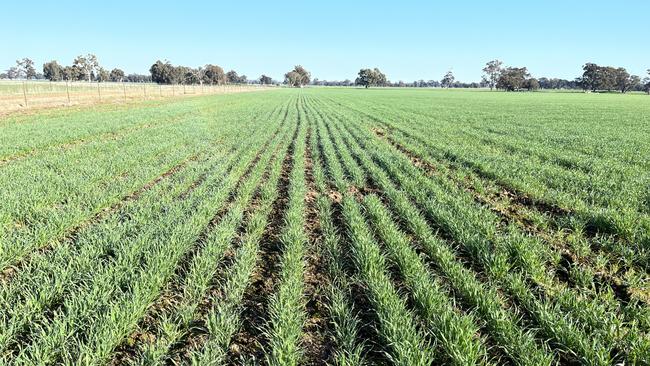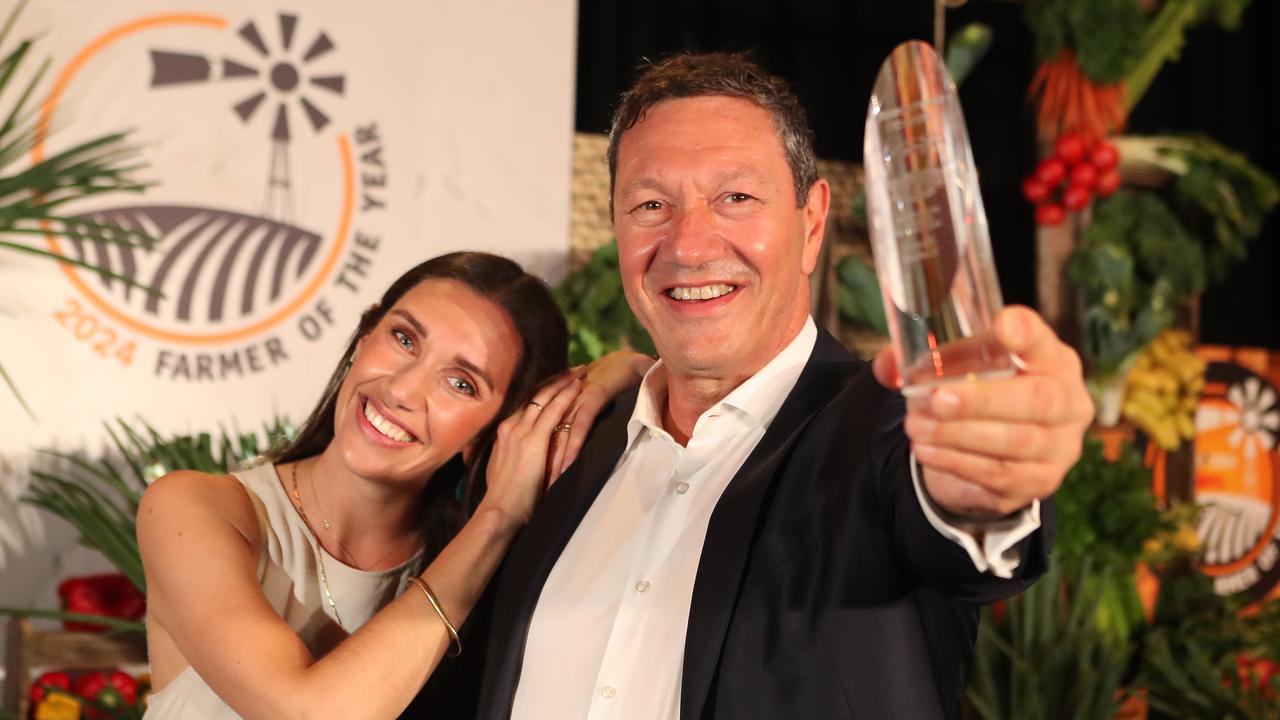NSW Farmers grains chair Justin Everitt shares secret to cropping success
Efficient rotations, an extensive tree-planting operation and attention to detail form the recipe for success at Brocklesby.
Putting food on people’s tables is one of the most rewarding things you can do, says Justin Everitt of Brocklesby in southern NSW.
Justin is the NSW Farmers grains committee chairman and farms at Aintree Park with wife Kate and children Thomas, 9, and Sophie, 6.
Together they run a mixed farming operation on 1250ha featuring winter crops, livestock and fodder, with Justin’s focus firmly on cropping in recent years.
In addition to continually working towards sustainable outcomes and improving production and soil health, he has successfully juggled farm advocacy work with the day-to-day running of the property.
He has combined sustainable production and an impetus to leave the land in better shape for the next generation, with a keen sense of leadership.
Canola, wheat, lupins, barley, oats, lucerne and mixed-species grazing crops are grown across 1000ha.
In a good year, wheat yields eight tonnes per hectare and canola up to three tonnes per hectare on the red soil, which expands into some grey clay areas.
The current shortage of urea is emerging as the biggest threat to yields, and estimated production could be cut by as much as 50 per cent.
Even with the challenges of primary production, Justin says agriculture is in his blood.
“I just can’t see myself doing anything else (and) when you have a win, you feel pretty proud of yourself,” he said.
“You know you are helping to feed the world.”

SOIL HEALTH
Extensive shelter belts along nearly every fence line are a telltale sign of the values at Aintree Park.
Justin said he had planted so many trees he’d lost track of the number.
“It can make cropping hard work, going around the trees, but having so many is nice …
and it helps to combat salinity,” he said.
The shelter belts protect the property and, more importantly, have helped to manage crops in wet years.
Despite forecasts of El Nino, 350mm of rain has fallen so far this year, quickly approaching the property’s annual average of 550mm.
The current six-year rotation has been in place in one iteration or another for up to 14 years and has helped to achieve overall goals, including reducing inputs by more than 10 per cent.
Anecdotally, Justin said he had noticed an improvement in soil health, and crops were emerging well, as there was less compaction.
Including lupins in the rotation, as a break crop and to inject nitrogen into the soil, has also helped to reduce chemical and fertiliser inputs.
“I like growing lupins, although they are not always easy to market,” Justin said.
The lupins are mostly sold as sheep feed. With the current depressed lamb prices, it was a market that may not look as promising as in previous years.
“We try and get canola, wheat, lupins, wheat, canola, then either barley or wheat after that,” he said.
The ethos behind this rotation strategy is to provide adequate break crops that enhance weed control and soil health.
“It is all about resilience and coming up with other strategies or workarounds when there are challenges,” he said, explaining the current urea shortage meant flexibility in rotations was valuable.
Decisions, such as sowing, are determined by the weather outlook.
“The traditional Anzac Day sowing deadline is out the window for us,” he said.
“We look to sow from around April on, but wait until there is rain.”

While Justin’s main focus is crops, there are still sheep and cattle on Aintree Park.
With about 1500 breeding ewes, in a mix of Merinos and crossbreds, the family plans to scale back ewe numbers to 500.
Dual-purpose grazing crops and lucerne for stock feed and fodder allow opportunistic grazing.
It was a case of assessing markets and seeing if margins could be had rather than running a breeding operation, Justin said.
ADVOCATING FOR CHANGE
Justin is in his third year as NSW Farmers grains committee chairman and will serve another if re-elected to fulfil the traditional four-year term.
“I remember being at my first NSW Farmers conference a few years back and decided younger farmers needed their voices to be heard,” he said.
The 41-year-old said there was still quite a way to go to ensure transparency throughout the supply chain.
He has been a constant advocate for road repair, and concedes that each trip to the silos last year resulted in vehicle damage.
“We had times when we did a tyre every trip (last harvest), and that gets expensive,” he said.
The need for multi-peril insurance to help mitigate risk among agricultural producers was also on his agenda.

Justin has mastered the art of a Zoom meeting and says his colleagues at NSW Farmers certainly saw a lot of the inside of his tractor.
He would join meetings on the iPad while sowing or harvesting.
This became the norm, particularly during the lockdown periods in the pandemic.
But now there’s a complete change. Meetings are again in-person, which means travelling to Sydney, Melbourne or other regional centres.
Regarding mixing agriculture and his role with NSW Farmers, Justin said he would encourage others to do it.
“We can’t let everyone else decide what is going to happen for us, it does come at a cost to the farm, but I hope I am making a difference,” he said.
The Weekly Times is searching for the best farmers from across Australia to profile as part of this year’s The Weekly Times Coles Farmer of the Year campaign.
If you know someone who deserves to be recognised as an outstanding farmer, let us know by nominating them in the form below.




